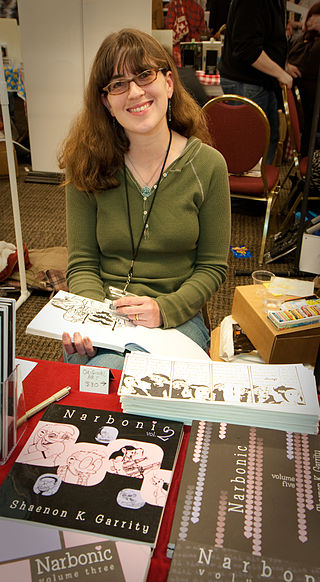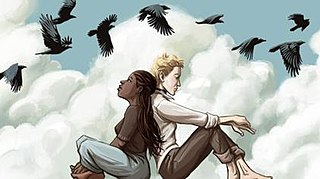Webcomics are comics published on the internet, such as on a website or a mobile app. While many webcomics are published exclusively online, others are also published in magazines, newspapers, or comic books.

Fetus-X was a weekly romantic horror comic written and drawn by Eric Millikin and Casey Sorrow. Millikin is an American artist and former human anatomy lab embalmer and dissectionist. Sorrow is an internationally known American illustrator and printmaker.

Modern Tales was a webcomics publisher active from 2002 to 2012, best known for being one of the first profitable subscription models for digital content. Joey Manley was the website's publisher and original editor. The site featured a roster of approximately 30 professional webcomic artists. Shaenon Garrity, one of the site's original artists, took over as the publication's editor in 2006. Other Modern Tales artists included Gene Luen Yang, James Kochalka, Dorothy Gambrell, Harvey Pekar and Will Eisner.

Joey Manley was an American LGBT fiction author, web designer, and webcomics publisher. Manley wrote the successful LGBT novel The Death of Donna-May Dean in 1992. He moved to San Francisco in 2000 in order to work in web design. Manley was the founder and publisher of the Modern Tales family of webcomics websites, which included Modern Tales, Serializer, Girlamatic, Webcomics Nation, and others. Manley is considered one of the "founding pioneers" of the webcomic movement for creating a then-revolutionary subscription model.
Serializer.net was a webcomic subscription service and artist collective published by Joey Manley and edited by Tom Hart and Eric Millikin that existed from 2002 to 2013. Designed to showcase artistic alternative webcomics using the unique nature of the medium, the works on Serializer.net were described by critics as "high art" and "avant-garde". The project became mostly inactive in 2007 and closed alongside Manley's other websites in 2013.

Keenspot is a webcomics/webtoons portal founded in March 2000 by cartoonist Chris Crosby, Crosby's mother Teri, cartoonist Darren Bleuel, and Nathan Stone.

Shaenon K. Garrity is an American webcomic creator and science-fiction author best known for her webcomics Narbonic and Skin Horse. She collaborated with various artists to write webcomics for the Modern Tales-family of webcomic subscription services in the early 2000s, and write columns for various comics journals. Since 2003, Garrity has done freelance editing for Viz Media on various manga translations.

Webcomics Nation was a webcomic hosting and automation service launched on July 29, 2005 by Joey Manley. Unlike Manley's previous webcomic sites, Webcomics Nation was based on user-generated content and relied on online advertisement revenue, which increased in viability in the second half of the 2000s. Webcomics Nation quickly became Manley's most financially successful website, and encouraged him to turn his Modern Tales sites partially free as well. Webcomics Nation began merging into Josh Roberts' ComicSpace in 2007, but this process took longer than hoped and Webcomics Nation eventually closed down in 2013.
Web fiction is written works of literature available primarily or solely on the Internet. A common type of web fiction is the web serial. The term comes from old serial stories that were once published regularly in newspapers and magazines.
Girlamatic was a webcomic subscription service launched by Joey Manley and Lea Hernandez in March 2003. It was the third online magazine Manley established as part of his Modern Tales family of websites. Girlamatic was created as a place where both female artists and readers could feel comfortable and featured a diverse mix of genres. When the site launched, the most recent webcomic pages and strips were free, and the website's archives were available by subscription. The editorial role was held by Hernandez from 2003 until 2006, when it was taken over by Arcana Jayne-creator Lisa Jonté, one of the site's original artists. In 2009, Girlamatic was relaunched as a free digital magazine, this time edited by Spades-creator Diana McQueen. The archives of the webcomics that ran on Girlamatic remained freely available until the website was discontinued in 2013.

Saturday Morning Breakfast Cereal (SMBC) is a webcomic by Zach Weinersmith. The gag-a-day comic features few recurring characters or storylines, and has no set format; some strips may be a single panel, while others may go on for ten panels or more. Recurring themes in SMBC include science, research, superheroes, religion, romance, dating, parenting and the meaning of life. SMBC has run since 2002 and is published daily.

Dicebox, by American cartoonist Jenn Manley Lee, is a science fiction webcomic which has been hosted at the subscription-based comics anthology site Girlamatic. The comic, planned for four books totalling 36 chapters, is set in the space-travelling future and is primarily the story of one year in the lives of two women factory workers, Griffen Medea Stoyka and Molly Robbins.

Girly is a webcomic created by Jaqueline Lesnick which follows the romantic relationship between two girls named Otra and Winter, as well as other citizens of the city of Cute-Town. It ran from 2003 until 2010. The author describes their work as, “a comic that went everywhere and did everything, for better or worse. But all in all it is a comic about 2 gals who love each other very much dawwww. Girly is a comic that helped sexually awaken a generation of readers, as well as (eventually) myself.”
Project Wonderful was an advertising service created by programmer and webcomic author Ryan North in late 2006. Headquartered in Toronto, Ontario, the service supported up thousands of webcomics and blogs with auctioned online advertisements, until it was shut down in 2018.
The history of webcomics follows the advances of technology, art, and business of comics on the Internet. The first comics were shared through the Internet in the mid-1980s. Some early webcomics were derivatives from print comics, but when the World Wide Web became widely popular in the mid-1990s, more people started creating comics exclusively for this medium. By the year 2000, various webcomic creators were financially successful and webcomics became more artistically recognized.

In contrast with mainstream American comics, webcomics are primarily written and drawn by women and gender variant people. Because of the self-published nature of webcomics, the internet has become a successful platform for social commentary, as well as lesbian, gay, bisexual, and transgender (LGBT) expression.
Notable events of 2005 in webcomics.
Notable events of 2013 in webcomics.
The business of webcomics involves creators earning a living through their webcomic, often using a variety of revenue channels. Those channels may include selling merchandise such as t-shirts, jackets, sweatpants, hats, pins, stickers, and toys, based on their work. Some also choose to sell print versions or compilations of their webcomics. Many webcomic creators make use of online advertisements on their websites, and possibly even product placement deals with larger companies. Crowdfunding through websites such as Kickstarter and Patreon are also popular choices for sources of potential income.










